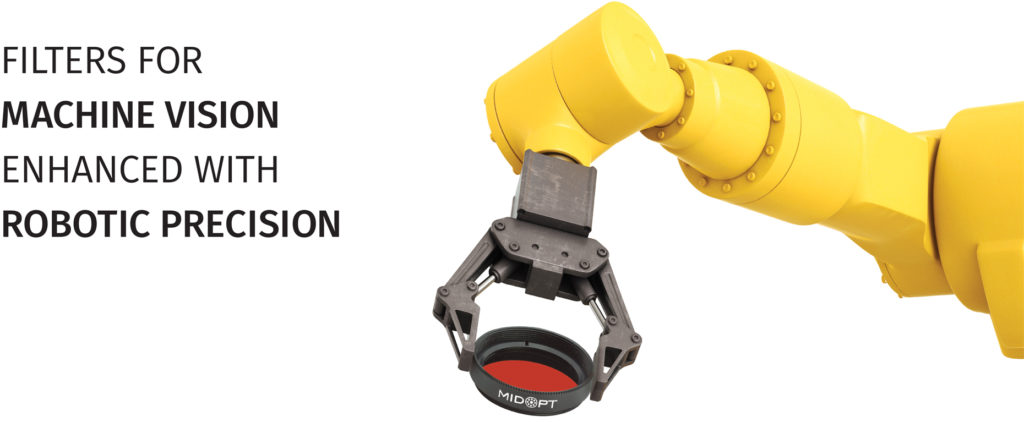For Machine Vision By Machine Vision
MidOpt filters designed for machine vision are now enhanced with robotic precision – Featured in MVPro MagazineMidwest Optical Systems (MidOpt) has more than 30 years of experience in industrial optics and is a worldwide leader in manufacturing filters specially designed for machine vision applications. MidOpt sets the industry standard for filter performance, and their recent addition is no exception to their tradition of excellence and innovation. MidOpt unveils an industry first, introducing cutting-edge robotic technology into their assembly system to ensure quality and repeatability by limiting the possibility of human error in the manufacturing and inspection processes. MidOpt filters offer many distinct advantages, including StablEDGE® technology, improved contrast, optical flatness control and an automation process that ensures filters that are free of imperfections.
StablEDGE® Filter Designs: MidOpt offers exclusive StablEDGE® technology across a full range of products. Compared to traditional coated interference filters, StablEDGE® designs are less sensitive to angular shifting, more rugged and offer superior lower wavelength blocking. Short-shifting, shown below, occurs when conventional filters are placed in front of industrial imaging lenses with focal lengths of 12mm or less (lenses with greater than 50 (+/-25) degree angular fields of view). This accounts for almost 60% of all lenses used today—a number that continues to grow as the demand for space forces inspection footprints to shrink.
Gaussian-Shaped Bandpass Design: To ensure that optical bandpass filters are most effective when used in monochrome applications, the position, height and width of the passband should emulate the bell-shaped spectral output curve of the LED illumination being used. MidOpt bandpass filters are designed with this principle in mind. While some filters are marketed as having a high and flat transmission profile to provide more even illumination, this shape can actually lead to an undesirable loss in contrast, as seen below. In these cases, the weaker tail ends of the LED spectral output curve dictate the fit of the bandpass design, allowing an overwhelming amount of ambient light to pass through in these regions.
Camera: 5 megapixel GimaGO camera
Lens: Kowa 12mm, f/1.8-11, 10 megapixel lens (Part #: LM12JC10M) iris set at f/11
Light Source: 630nm red LED and broad spectrum metal halide light
Control of Optical Flatness Following Mounting: When assembling optically flat, precision polished filters into tightly screwed down filter mounts, interferometric measurements reveal drastic deformations caused by the stress of assembly. The resulting optical distortion can significantly impact image quality, as seen in the examples below. New MidOpt robotic technology allows each filter to be gently and securely held in the filter mount by the retaining ring. After ideal torque is applied, controlled amounts of thread-locking compound are dispensed to prevent the retaining ring from shifting.

Greater Consistency in Inspection for Imperfections: The new MidOpt robotic assembly station also guarantees consistency and uniformity when inspecting scratches, digs and other cosmetic defects. A greater variety of inspection lighting, increased magnification and additional inspection steps are employed, and the variability of individual perception is removed from the inspection equation. This results in pristine optical surfaces and unmatched image quality. Ensure that industrial imaging applications are performing optimally with superior optical filters produced with new generation robotic technology.

In addition to producing filters designed for machine vision systems, MidOpt also offers the largest selection of mounted filter sizes in the world, in-stock and ready to ship. Mounts range in size from M13.25 to M105 and are compatible with virtually any lens or camera. Should your system need a custom mounting solution, the experienced MidOpt team can design a unique solution for you. For more information about machine vision filters, mounting solutions or robotic assembly, contact us.


